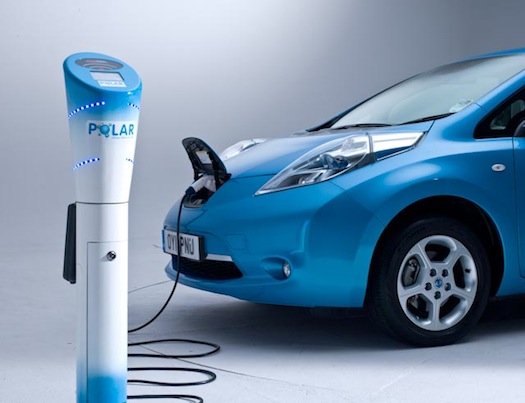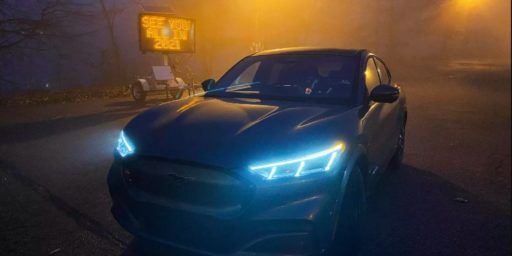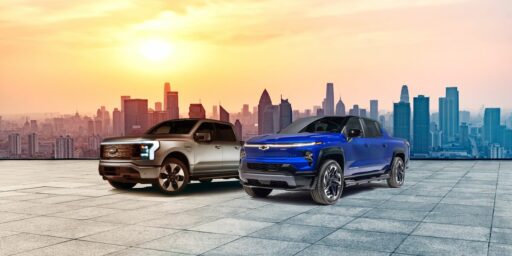Electric Cars Suck Less Than People Think
Popular Science is keeping the recent surge of stories on electric vehicles going with "8 Things You Should Know About Electric Cars."
Popular Science is keeping the recent surge of stories on electric vehicles going with “8 Things You Should Know About Electric Cars.”
Even those of us who’ve only been paying attention out of the corner of our eye know the first two: electric cars are more expensive to buy than their gas counterparts but they’re cheaper to operate. The third–“Some plug-in cars have engines as well; some don’t”–is of little interest to most consumers. The next two, though, dispel some longstanding concerns:
4. Electric cars are much nicer to drive than you think.
We’re pretty much past the, “Oh, they’re all golf carts” stage. But a lot of drivers don’t (yet) know that electric cars are very quiet (no engine or transmission noises when running on battery power), as well as surprisingly torquey.
Their motors produce maximum output from 0 rpm, so acceleration away from a stop is strong and smooth. Drivers like that.
And the fact that electric cars are a nicer driving experience may be their secret weapon once they arrive in volume.
5. Range anxiety abates.
It’s entirely normal for drivers to worry as they see the number of available miles on a battery electric car ticking down toward zero.
But as experienced electric-car owners will tell you, in general you drive fewer miles each day than you think—and over time, you get comfortable that a fully charged electric car really can deliver that number of miles, reliably, over and over and over.
In terms of my daily commute or even a trip to the mall, any of the electrics out there now already meet my needs. None of them yet make the grade for long road trips, which I expect will be a more common part of my life as the girls get older, particularly given the rising cost of airfare. But, by the time I’m in the market to replace my daily commuter (a 2008 BMW 328i convertible) that problem will likely be solved through a combination of improved battery technology and charging infrastructure. And, for that matter, I’ve got a 2010 Toyota minivan that will likely last me another decade since I essentially use it only for longer trips.
Especially if fuel prices remain above $4 a gallon, I could certainly see myself in something like the Tesla Model S in a few years. By that point, prices will be more reasonable. And, I hope, they’ll have a convertible that seats five. And assuming robots haven’t taken over the driving by then.






This is the one thing that holds me back cause living where I do, almost all of my commutes are at least 45 miles one way. I can easily see myself in a Prius at some point or maybe after I retire an all electric car. A few solar panels on my car port roof and I could be driving for free. (well, almost)
I would LOVE an electric car, I would totally do it. But they’re still way too expensive. But that’s more a complaint about all new cars and not just the electrics. I’ve never purchased a new car in my life, and can’t imagine I ever will. The prices are bat*$% insane. The payment on a medium-priced new car is more than half as large as my mortgage, and would be larger than my wifes and my student loan payments combined. And most of these cars are far too new for there to be a good pool of used cars.
Also, the other big problem is occasionally I’ll have a crazy day where I need to drive more than 200 miles, and I’ll need to stop to recharge on the road. The quick-charge stations that you can use aren’t quick enough. When I need to gas up my car, it takes 3-5 minutes. If I need to charge my car on the road, it takes 30 minutes to an hour. That’s just simply impractical and the other main impediment to me taking the plunge after the entry price.
I have a Prius, but would prefer a combination of an electric city car and a jeep for trips.
A Prius-Jeep transformer would be ideal.
Electrics utterly fail for me on both range and recharging. While most of my driving is all short-range that an electric could handle, I make regular 2,000-mile and 600-mile trips for which an electric just won’t do.
Living in an apartment, I don’t have a garage in which I could put a recharging station. I don’t see myself talking the complex owners into installing 200+ charging stations, either.
At most, a hybrid would have to do.
Electric cars don’t suck at all. The driving experience is far nicer; more acceleration at low speeds, far quieter (great for listening to music) and very, very smooth. Electric motors last essentially forever (Amtrak just retired some electric locomotives after a few million miles), and in general electric cars are very reliable.
The two downsides at present are cost and range. We have a 2013 Volt, so range is not an issue (although we’ve driven about 1000 miles per month and haven’t put gas in the car for about two months now), and the cost is already coming down sharply. Chevy is predicting the next Volt will cost about $10K less, and there is a lot of R&D activity in the battery area.
As regards cost, we leased ours. By my calculations, our total ownership cost is less than for something like a Honda Civic, although obviously that reflects the $7.5K tax credit as well. But that tax credit is doing a lot of things, including reducing imports of oil by several thousand gallons over 10 years, reducing air pollution and CO2 emissions, and subsidizing an emerging industry that is, in my opinion anyway, unquestionably the wave of the automotive future.
Depending on how frequently someone does long distance trips, the cost-benefit analysis might weigh towards owning an electric car and renting a gas-powered car for road trips.
I’ve driven a Volt and the drive is very much what you would expect from a small car. Better pick up and go than my daughter’s Cruze. As Robert Levine mentioned range isn’t an issue as it can generate electricity off its gas engine, and still get 30+ mpg using the gas engine for longer trips. For shorter trips the gas engine isn’t used at all.
I think that the present generation of electrics suck far more than people think. Not only do they have the problems listed in the body of the post and in the comments, they’re expensive, on a total lifetime basis they probably don’t save much in carbon production relative to efficient internal combustion engine vehicles and they have other noxious outputs.
A better solution for the ecologically-minded are the good diesels available in Europe and much less available here.
@rodney dill:
I considered the Volt. It’s 38K price seems high, but the 7.5K tax credit brings it back down near reasonable-land. But the electric engine only has a 38 mile range, that would only cover half of my daily round-trip commute. And twice a week, I go 50-60 miles to visit friends and family. So I’d still be using the gas engine a lot of the time, and the 7-8 mpg increase in gas mileage from the car I’m driving now doesn’t justify the increased purchase cost.
@John Burgess:
As long as you understand that is a very limited use case.
Most people live in multi–car families.
Most of those families have at least one local commuter.
Therefore most families could have a car which doesn’t make the long trips.
Heck, most families probably already have a car they do not use on the long trips.
@Ben: I understand the trade off. For your normal commute you’d average 60-70 mpg with the Volt, (only using the gas engine essentially one way). for consistently longer trips (without a way to recharge a work) the average mpg would approach something like 32 MPG (I forget exactly what the stated mpg is)
Still its expensive. I’d consider one for a lease, but I can’t get it with an employee discount… or an employee offer that would put it in the $350 a month range.
I think people who buy the Volt (1) have a little money to burn, (2) enjoy the tax credit, and (3) enjoy not going to the gas station.
For very busy people not worrying about gas is a big one.
“Cost” is the biggest barrier for me. I can’t afford a new electric car, and I’m not sure how well “used electric cars” would work out (since you have to replace the battery, and that’s really expensive).
Will there be a used market for electric cars?
@Dave Schuler: We needed a contrarian in this thread, thanks for that!
Fair points, but it all really comes down to battery tech. In terms of total man-hours in history, I believe the research on internal combusion engines probably crushes the amount of research on batteries. But in due time, they’ll be made to charge faster, hold more energy, and use more environmentally-friendly materials (including the manufacturing).
@Franklin:
Sure, I’m sure they will. But this article is about whether they suck now, or not.
In addition to already stated shortcomings on range and charge time, they also have a limited lifetime (as does any rechargeable battery), which I’ve heard quoted as being around 100,000 miles before they have to be replaced (at a cost I’ve seen reported as 10 to 15 grand). That is no better than half the normal lifetime of a combustion engine, and a replacement cost nearing half the new purchase price of the car.
Those are significant barriers to widespread acceptance for now. And it’s a shame, because I’d be hopping on board if those issues were addressed.
@Ben: Battery technology is without a doubt the biggest problem with electric cars right now.
I still can’t get over the range thing. I mean, I understand that most of the time you don’t need a car that can do X, but it’s something that jumps out at you when you really do need it. My wife could have driven an electric car to and from work for the past year and it mostly wouldn’t have been a problem. Except when it was because my car was in the shop and we needed to drive out to somewhere else. Or when we need to go somewhere with two cars. At that point, you’d have to rent.
It’s sort of like how I love Smart cars conceptually. But couldn’t really get one because sometimes you need more than a two-seater. (Add to this the fact that insurance is charged by the car, which makes trying to be flexible – “we drive the electric car most of the time, but we have the old van in the garage just in case” – non-economical.
We don’t own a hybrid, but I’d have little hesitation getting one. Electric car is a tougher sell.
Well, the Tesla S does a bit more than “suck less”, in fact Consumer Reports says it may be the best car they have ever tested. Not the best electric car, the best car. Period.
Best car ever? (video)
Bad new for people who have an ideological hatred of energy efficiency, good news for the rest of us.
As he reminded me the other day, James has already posted about the Tesla S.
@Trumwill:
This does irritate me greatly. The insurance company knows we have three cars in a family with only two drivers. Therefore … only two could possibly be being driven at a time. At best you can get a few percent off the third car as a “discount” when it really should be 100% off. (Okay, okay, 90% off because they might cover it if a fire consumes the garage or something highly unusual like that…)
One would be our second car now if the price was lower. It’s a simpler machine, they should be cheaper, way cheaper, and I suspect they will be when produced in volume by competing company’s.
Wouldn’t even consider it as the only car we had, but my wife could certainly use one as her commute ride.
@Franklin:
There is no Moore’s Law for batteries. It’s just how much energy you can pack into how small a space. It’s even possible that what we’ve got is about as good as it gets.
@anjin-san:
Mmmmm, me want.